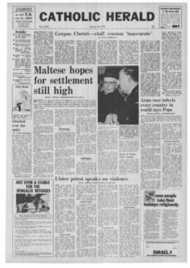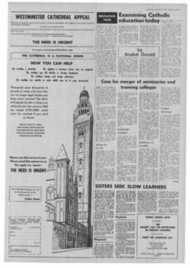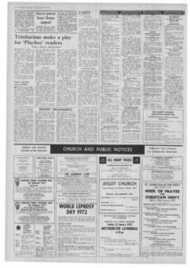Page 1, 14th January 1972
Page 1

Report an error
Noticed an error on this page?If you've noticed an error in this article please click here to report it.
Tags
Share
Related articles
Mgr. Gonzi Lifts Interdict From Dom Mintoff
Mgr. Gonzi Backed Strikers
Vatican Intervention On Malta Finances
Archbishop Gonzi Of Malta Resigns
Archbishop Gonzi Opens London's Malta Centre
Maltese hopes for settlement still high
FROM A SPECIAL CORRESPONDENT IN MALTA DESPITE the apparent failure of Archbishop Sir Michael Gonzi to persuade Mr. Heath to increase his offer for the continued use of Malta bases, the Archbishop's visit, which ended on Wednesday, has raised Maltese hopes that a solution may be worked out between Malta, Britain and her NATO allies.
The people of Malta are united behind Maltese Prime Minister, Mr. Dom Mintoff because they feel the claims that he has made are fair and just. There is a widespread feeling that Malta has been Jet down by Britain, and that this is not a withdrawal, but a divorce.
Archbishop Gonzi's visits to the Pope and Mr. Heath, which came after Mr. Mintoff had seen the Archbishop last week, were generally welcomed on the island.
The Archbishop has tremendous support from all sides, and his action is the first fruit of an agreement between the Maltese Labour Party and the Church, made last year, which brought a long conflict to an end. He did not go to negotiate, or as an official spokesman, but to make one last desperate attempt to help the people.
The withdrawal by Britain is a matter of life and death for the people of Malta, and the Archbishop evidently hoped to get both sides talking. It was hoped, too, that the Pope would send some sort of message to Mr. Heath.
,Talks with Mr. Heath were on the basis of the ties and sentiments that exist between Malta and Britain, and the Archbishop is expected to refer back to the Pope the results of his discussions. take Mr. Mintoff's threats over the future of British bases on the island seriously. But it is now clear that he was not bluffing. The people do not want the British to leave, but the island's economy needs bolstering and if Britain cannot help on its own, the possibility that the U.S. and other NATO countries can is being discussed.
Economy It is doubtful that the troops who have already left will ever return. Over 7,000 Maltese will become unemployed if the withdrawal goes ahead and their loss of earnings will effect a much larger number. The loss would also have such a bad effect on the economy of the Island that it would become unbalanced.
The rumour that Mr. Mintoff's government planned to seize Church property is now generally discounted. This was originally circulated by the Italian paper // Tempo.
General reaction to the possible British withdrawal from Malta is one of sadness. Morale has sunk low, but Malta has escaped from some pretty tight quarters in the past and the belief is that the Maltese will overcome this crisis too.
A staff reporter writes:
Mr. Kevin Muir, Secretary of the Laity Commission of England and Wales, who spent last weekend in Malta, said the Archbishop was supported by a significant proportion of the Maltese Labour Party.
"Members of the business community I met were tremendously worried about the threat of unemployment and the unrest it might lead to," said Mr. Muir who visited Malta to address a rally of the CANA, family movement. "But most people are refusing even to envisage the problems of withdrawal, and are living in hopes.
The 86-year-old Maltese Archbishop went to Rome last week after he had received a visit from Mr. Dorn Mintoff, the Maltese Premier, traditionally a political foe.
In Rome on Friday last the Archbishop saw the Vatican Secretary of State, Cardinal Jan Villot, and the assistant Secretary, Archbishop Giovanni Benelli. On Saturday last he had a private audience with Pope Paul.
Attitudes
The subjects discussed at the meetings were not revealed, but a Vatican statement said the Archbishop had spoken of "matters of a pastoral and religious character" with the Pope. This statement was reported to have been criticised by the Archbishop as being A 90-minute talk with Mr. Edward Heath at Chequers on Monday was described as "informal, private and friendly." The Archbishop, it was said, wanted to underline the seriousness of the British withdrawal from Malta and to sound out British attitudes. Archbishop Gonzi is no stranger to Britain, having spent some time here during the last war, and he lunched with the Queen the day after he had met the Prime Minister.
He returned to Rome on Wednesday to see the Pope, and NATO countries met to decide whether they could go some way towards bridging the gap between the £9i niillion Britain is prepared to pay to maintain a base on the Island and the £18 million Mr. Mintoff has demanded. America is anxious to see the base maintained and an Italian delegation visited Malta this week.
The Archbishop, who is very popular among his people, commissioned a recent study of Archbishop Gonzi of Malta, with his personal doctor, leaving the Franciscan Convent in St. George's Square, Vieloria, London, where he stayed after his arrival. On Monday he had talks with Mr. Heath, the Prime Minister, and on Tuesday he had lunch
with the Queen.
Church wealth in 'Malta, estimated at £1.68 million. He has backed the recommendations of the study which showed how the resources could be put to better use in serving the public good, despite opposition from the better endowed parishes.
blog comments powered by Disqus











